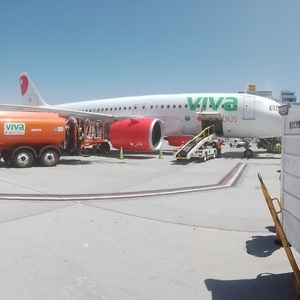Avfuel, Neste supply SAF to Viva Aerobus

July 21, 2022
BY Avfuel Corp.
Fulfilling its commitment made on World Environment Day, Viva Aerobus—Mexico’s ultra-low-cost airline—took its first flight powered by sustainable aviation fuel from Los Angeles to Guadalajara on June 15. The uplift was made possible by the partnership between Avfuel and Neste.
The fueling milestone positions Viva Aerobus as a Mexican leader in reducing the aviation industry's carbon footprint. With a delivery of 7,500 gallons of Neste MY Sustainable Aviation Fuel, Viva Aerobus was able to reduce lifecycle carbon emissions by 21 metric tons, the equivalent of the amount of CO2 sequestered by 24.9 acres of U.S. forests per year.
Viva has set an ambitious goal to purchase 1 million liters (or nearly 265,000 gallons) of SAF. To reach this goal, Avfuel and Neste are collaborating with Viva on a potential long-term SAF supply agreement. Neste, with its global, fast-growing SAF production, and Avfuel, with its global distribution logistics expertise, are uniquely positioned to help Viva achieve its SAF commitment.
Advertisement
Advertisement
“Viva's SAF flight, its most-eco-friendly flight, [was] a milestone for efforts to decarbonize our industry …” said Juan Carlos Zuazua, CEO of Viva Aerobus. “We are excited to take this big step in Mexico's aviation history aimed at reducing GHG emissions. We keep strengthening as the greenest Mexican airline, having the lowest number of CO2 emissions per passenger in the country. We are always looking for new ways to add value to our service, not only through low fares and reliability, but also by creating an airline industry focused on sustainability. When using SAF, for instance, we contribute directly and indirectly to 10 of the 17 Sustainable Development Goals of the United Nations’ 2030 Agenda.”
Viva is guided by its environmental culture “El Futuro es Verde” having as one of its most significant goals to reduce its CO2 emissions per seat per kilometer and CO2 emissions per passenger per kilometer by more than 15% by 2025. This goal will be possible thanks to Viva's disciplined operation, characterized by high load factors and the advanced technology of its aircraft; the airline boasts the third youngest fleet in North America (at an average of five years) with highly efficient and new generation engines, maximum seat density and non-stop direct flights.
Today, sustainable aviation fuel is the most effective way to reduce a flight’s carbon footprint. In the future, SAF could deliver up to 80 percent less greenhouse gas emissions over its lifecycle versus traditional jet fuel if used in its neat, concentrated form.
Neste MY SAF is made from sustainably sourced, renewable waste and residue materials—such as used cooking oil. It is a fully approved drop-in fuel that, once blended with petroleum jet fuel, meets ASTM D-1655 specification for conventional jet fuel and performance standards under all operating conditions. This makes Neste MY SAF an optimum solution to directly reduce greenhouse gas emissions from aircraft, requiring no new investments, modifications or changes to the aircraft, fuel distribution procedures or airport fuel storage tanks.
Advertisement
Advertisement
Those interested in learning more about sustainable aviation fuel are encouraged to visit Avfuel.com/SAF or contact Keith Sawyer, manager of alternative fuels, at ksawyer@avfuel.com for more information.
Related Stories
Calumet Inc. on Aug. 8 confirmed its Montana Renewables biorefinery is currently running at full capacity. An initial phase of the company’s MaxSAF initiative remains on track to boost SAF capacity to up to 150 MMgy by mid-2026.
Marathon Petroleum Corp. on Aug. 5 released second quarter financial results, reporting improved EBITDA for its renewable diesel segment. The company primarily attributed the improvement to increased utilization and higher margins.
Chevron Corp. on Aug. 1 confirmed the company started production at the Geismar renewable diesel plant in Louisiana during the second quarter after completing work to expand plant capacity from 7,000 to 22,000 barrels per day.
The public comment period on the U.S. EPA’s proposed rule to set 2026 and 2027 RFS RVOs and revise RFS regulations closed Aug. 8. Biofuel groups have largely expressed support for the proposal but also outlined several ways to improve the rulemaking.
In celebration of World Biodiesel Day, MOL Group on Aug. 8 announced SAF was successfully produced for the first time at INA’s Rijeka Refinery during a pilot project to process biocomponent. Renewable diesel was also produced.
Upcoming Events










